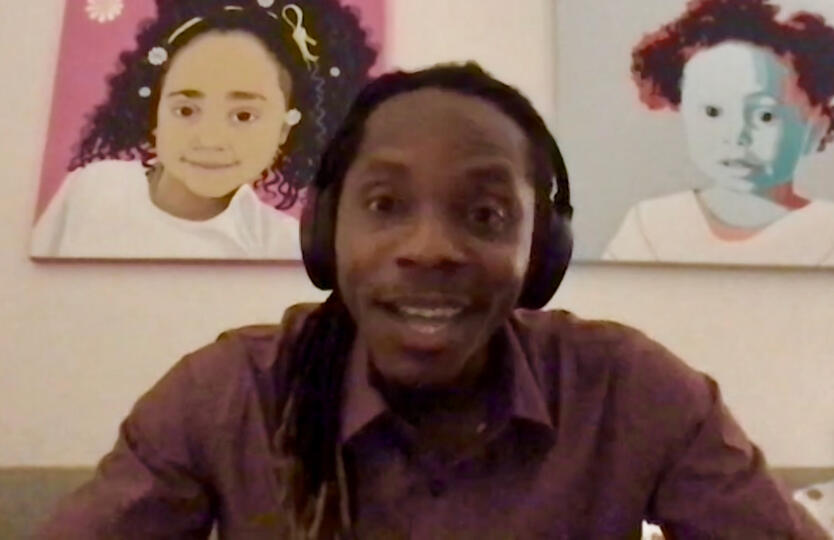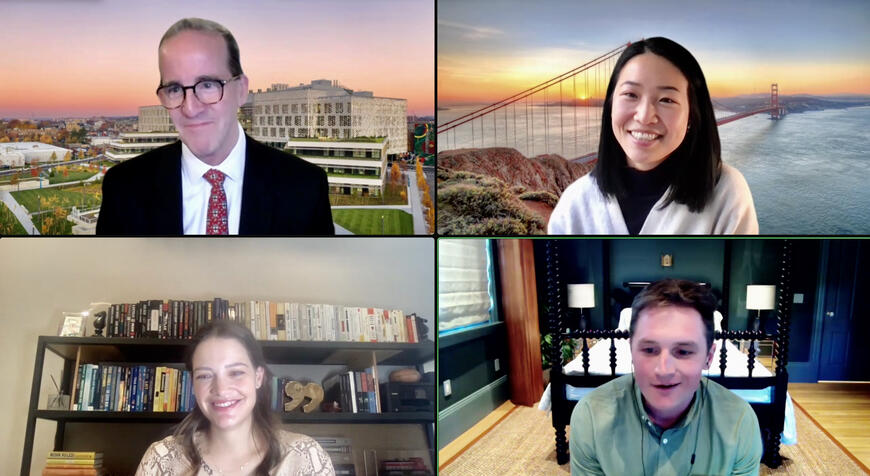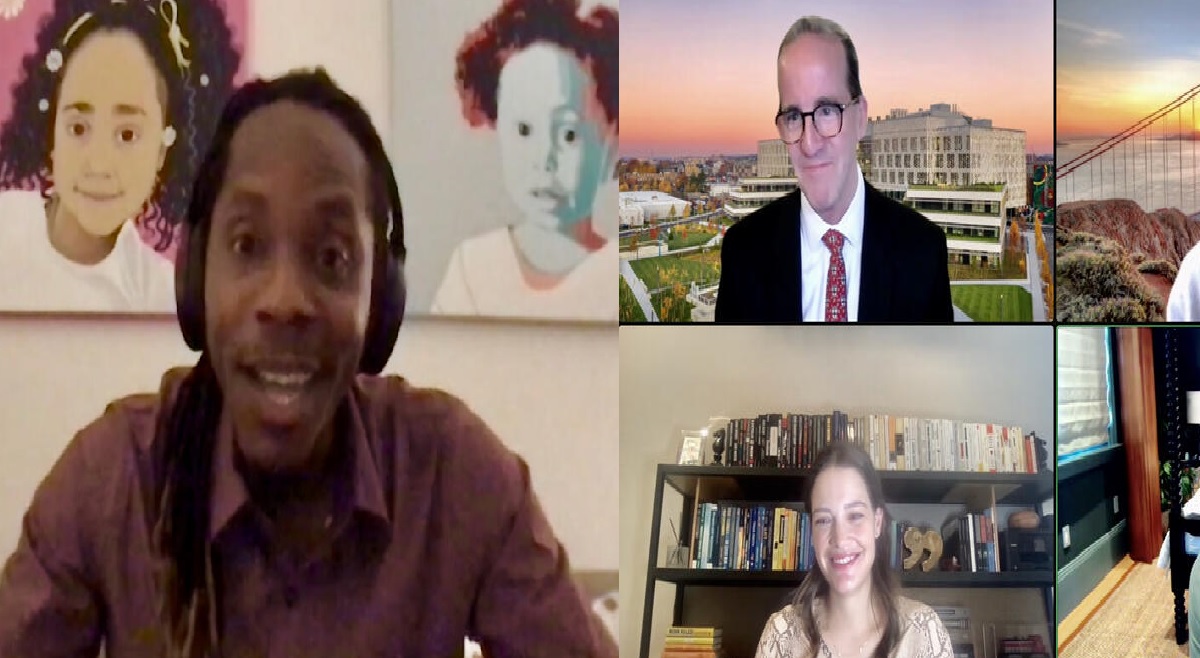Sierra Leone’s Minister of Basic and Senior Secondary Education and Chief innovation officer shared some of his experiences with the Havard School of Engineering and Sciences from which he obtained his undergraduate degree.
At the sixth annual Sophomore Convocation on Feb. 10, the newest members of the Harvard John A. Paulson School of Engineering and Applied Sciences (SEAS) were reminded that the opportunities to learn – and to find their future career paths – extends beyond the classroom. Every experience in a student club or extracurricular organization, job in a lab, internship, or personal relationship with a professor can help SEAS students determine their unique contribution to their fields.
“It’s OK to have a great GPA, but it’s much better to have a wonderful, balanced life,” said David Sengeh, S.B. ‘10 and the night’s keynote speaker. Sengeh studied biomedical engineering at SEAS and is now the Chief Innovation Officer and Minister of Basic and Senior Secondary Education for the Republic of Sierra Leone.
Dean Frank Doyle addresses the SEAS Class of 2024 at the sixth annual Sophomore Convocation on Feb. 10. (Credit: SEAS)
Dean Frank Doyle welcomed the largest sophomore class in SEAS history, opening his virtual presentation by highlighting the SEAS Mission & Vision of using novel, cross-disciplinary approaches to science and technology to address societal challenges in service to the world.
The 430 members of the SEAS Class of 2024, who will study computer science, applied mathematics or engineering, comprise 21 percent of all Harvard sophomores. The SEAS Class of 2024 includes 180 declared concentrations in computer science, and 148 in applied mathematics.
The sophomore class includes 41 percent women, and 27 percent students who identify as part of an underrepresented minority – both above national averages, according to the American Society of Engineering Education (22 percent women, 16 percent URM).
The SEAS Committee on Diversity, Inclusion and Belonging, which was formed in 2017 and is open to undergraduate student participation, focuses on recruitment, mentoring and building community.
“We are committed to making SEAS an open and welcoming environment for all students,” Doyle said. “We want our student body at SEAS to reflect the broader population of College students.”
Sengeh described his own journey from Harvard to his current role at the highest levels of government in Sierra Leone. Sengeh arrived on campus hoping to work on prosthetic limbs, but conversations with instructors such as Paul Bottino, Executive Director of Innovation Education at SEAS, lead him to work on drug delivery for tuberculosis vaccines in the lab of bioengineer David Edwards. That lab experience continues to benefit Sengeh to this day, as organizing distribution of COVID-19 vaccines is one of his responsibilities as Chief Innovation Officer.
“Take advantage of the faculty,” Sengeh said. “Go and knock on faculty doors and tell them about your crazy ideas, because you never know.”

David Sengeh (S.B. ’10), talks about his journey from SEAS biomedical engineering student to Chief Innovation Officer and Minister of Basic and Senior Secondary Education for the Republic of Sierra Leone at the sixth annual Sophomore Convocation on Feb. 10. (Credit: SEAS)
Sengeh also discussed the organizations he was part of while at SEAS, including the Harvard Society for Black Scientists and Engineers, the club soccer team, and Kumbaa Singers of Harvard College. He continues to sing, rap and make music.

“The random relationships that we make actually do resurface in our lives,” Sengeh said. “Senior year, I was somehow lucky enough to be chosen to introduce Bill Gates. Many years later, the Gates Foundation ended up supporting us to do innovation work in governance because of the relationship that we had.”
The Convocation also included a panel of three alumni: JN Fang (A.B. ‘16), Carolina Ragolta Grossman (A.B. ‘13), and Sam Steyer (A.B. ‘11). All three have founded or worked for start-up companies since leaving SEAS, which allowed them to follow their passions and professional goals.
“We should be solving really big problems,” said Fang, a software engineer currently in the exploration phase for an upcoming start-up. “The world can’t afford for you to be risk-averse.”
Steyer is CEO and co-founder of Greenwork, which connects climate-conscious employers with potential frontline workers in those fields. Grossman is the Director of Product Management for launch systems at Astra, a start-up specializing in affordable space launch operations for satellites.
Grossman lauded SEAS for its focus on diversity, which helps diversify the workforce by empowering women and people from previously underrepresented minorities.
Clockwise from top left: Harvard Dean Frank Doyle interviews the SEAS alumni panel of JN Fang (A.B. ’16), Sam Steyer (A.B. ’11) and Carolina Ragolta Grossman (A.B. ‘13) at the sixth annual Sophomore Convocation on Feb. 10. (Credit: SEAS)
“Everyone can learn something, and everyone has something unique to bring to the table through their background and experiences,” Grossman said.
All three were part of multiple clubs and organizations at Harvard. Steyer played for the Crimson men’s lacrosse team. Fang was part of Women in Computer Science, and founded both the Women Engineers Code conference and the Harvard Women in CS Advocacy Council. Grossman’s activities included the Delta Gamma sorority, Sablière Society and the Cuban Students Organization.
For all three, those organizations helped develop contacts and friendships and maintain personal balance and mental health.
Internships also proved integral to the panelists’ career decisions, though not always in the way they expected. Grossman realized she wanted to work in the private sector after finishing an internship at NASA, and Steyer cited several research and investment internships that helped clarify his career goals.
“They were a quick way to realize that those weren’t the paths I wanted to go down,” Steyer said. “It’s not a waste of time to try things out and have a cool experience, even if it isn’t what you end up doing.”
The SEAS Mission is prominently displayed near the entrance to the School’s flagship Science and Engineering Complex, which opened in Allston in Fall 2020, signifying the opportunity for students to carve their own unique path through the worlds of engineering and applied sciences.
“The opportunities are nearly limitless,” Doyle said. “Our commitment is to provide you with an educational experience that will empower you to make a difference in the world. As the newest members of our SEAS community, we hope you two will embrace this mission.”











